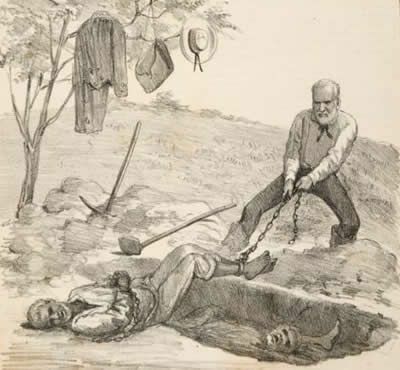A Sexagenarian Law, also known as Saraiva-Cotegipe Law, was promulgated on September 28, 1885, and had as one of its objectives to contain the abolitionists.
However, this law gave more strength to those who fought for freedom.
see more
Scientists use technology to unlock secrets in ancient Egyptian art…
Archaeologists discover stunning Bronze Age tombs in…
What was the Sexagenarian Law – Summary
 The Sexagenarian Law was presented to Parliament in 1884 by Senator and Minister Manuel Pinto de Sousa Dantas, also known as Senador Dantas. On one side were the abolitionists, people who fought for the end of slavery.
The Sexagenarian Law was presented to Parliament in 1884 by Senator and Minister Manuel Pinto de Sousa Dantas, also known as Senador Dantas. On one side were the abolitionists, people who fought for the end of slavery.
On the other were farmers, who formed the country's agricultural elite, mostly slaveholders, who wanted financial compensation to compensate for the properties (slaves) they were going to lose.
Senator Dantas' proposal proposed assistance to freedmen, the creation of agricultural colonies and the freeing of all slaves over 60 years of age, without compensation to landowners.
Because it was a law that went against the positions of landowners and liberals, a controversy was triggered, which generated a debate that lasted a year. However, the law was only approved when senators José Antônio Saraiva and Barão de Cotegipe proposed an amendment that increased the length of service to indemnify the owner.
Sexagenarian Law in full
Brazilian Law No. 3,270 of September 28, 1885 (SEXAGENARIANS LAW)
d. Pedro II, by the Grace of God and Unanimous Acclamation of the Peoples, Constitutional Emperor and Perpetual Defender of Brazil: We make known to all Our subjects that the General Assembly Decreed and We Want the Law Following:
REGISTRATION
Art. 1° The new registration of slaves will be carried out throughout the Empire, with declaration of name, nationality, sex, affiliation, if known, occupation or service in which he is employed age and value calculated according to the table of the §3º.
§1 The registration for the new registration will be made in view of the relations that served as the basis for the special registration or registration made pursuant to the Law of 28 September 1871, or in view of the certificates of the same registration, or the annotation, or in view of the title of the domain when the registration of the slave.
§2 The age declared in the old registration will be added to the time elapsed until the day on which the list for the registration ordered by this law is presented to the competent department.
The registration that is carried out in contravention of the provisions of §§ 1 and 2 will be null, and the Tax Collector or Agent who will incur a fine of one hundred thousand réis to three hundred thousand réis, without prejudice to other penalties in which it may incur.
§3 the amount referred to in art. 1 will be declared by the slave's master, not exceeding the maximum regulated by the age of the enrolling person according to the following table:
Slaves under 30 years old 900$000;
from 30 to 40” 800$000;
from 40 to 50” 600$000;
from 50 to 55 400$000;
from 55 to 60 200$000;
§4° The value of female individuals will be regulated in the same way, with, however, a 25% discount on prices above this.
§5 Slaves from 60 years of age and older shall not be given enrollment; they will, however, be registered in a special list for the purposes of §§ 10 to 12 of article 3.
§6° The deadline granted for enrollment will be one year, which must be announced by notices posted in the most public places 90 days in advance, and published by the press, where available.
§7° Slaves who have not been enrolled within the set period will be considered freed, and this clause will be expressly and fully declared in public notices and press advertisements.
Slaves aged 60 to 65 who have been enrolled will be exempt from providing services.
§8 The persons who are required to register alien slaves, pursuant to art. 3 of Decree No. 4,835 of December 1, 1871, will indemnify the respective masters for the value of the slave who, due to not having been registered in due time, remains free.
The mortgage or pledge creditor is also responsible for registering the slaves constituted as collateral.
Collectors and other Tax Agents will be required to provide a receipt for the documents delivered to them. for the registration of the new enrollment, and those who fail to effect it within the legal period will incur the penalties of the art. 154 of the Criminal Code, excepting you the right to request the registration again, which, for legal purposes, will be in force as if it had been carried out within the designated time.
§9° For the enrollment or enrollment of each slave, 4$ of emoluments will be paid, the amount of which will be destined to the emancipation fund, after the enrollment expenses have been satisfied.
§10 As soon as the registration deadline is announced, the fines incurred for non-compliance with the provisions of the Law of September 28, 1871, regarding the registration and declarations prescribed by it and by the respective regulations.
Whoever frees or has freed, free of charge, a slave, any debt to the Public Treasury for taxes relating to the same slave is remitted.
The Government, in the Regulations that it issues for the execution of this law, will set a single and the same period for the verification of registration throughout the Empire.
Art. 2. The emancipation fund will be formed:
I – Fees and rents allocated to it in current legislation.
II – An additional 5% rate on all general taxes, except export taxes. This fee will be charged from now on free of collection expenses, entered annually in the budget of the revenue presented to the General Legislative Assembly by the Minister and Secretary of State for Farm.
III – Public debt securities issued at 5%, with annual amortization of 1/2%, with interest and amortization paid at the aforementioned rate of 5%.
§1° The additional fee will be collected even after the release of all slaves and until the debt resulting from the issue of the titles authorized by this law is extinguished.
§2° The emancipation fund, referred to in paragraph I of this article, will continue to be applied in accordance with the provisions of art. 27 of the regulation approved by Decree No. 5.135, of November 13, 1872.
§3 The Product of the additional fee will be divided into three equal parts:
The 1st part will be applied to the emancipation of older slaves, according to what is established in Government regulations.
The 2nd part will be applied to the deliberation for half or less than half of its value, of the slaves of farming and mining whose masters want to convert the establishments maintained by slaves.
The 3rd part will be destined to subsidize the colonization through the payment of transport of settlers who are effectively placed in agricultural establishments of any nature.
§4 To develop the resources used in the transformation of agricultural establishments served by slaves into establishments free and to help the development of agricultural colonization, the Government may issue the titles referred to in No. III of this article.
The interest and amortization of these securities cannot absorb more than two thirds of the proceeds of the additional fee set forth in paragraph II of the same article.
MANUFACTURED AND RELEASED
Art. 3. The slaves enrolled in the enrollment will be freed upon compensation of their value by the emancipation fund or by any other legal form.
§1 From the original value with which the slave is registered, the following shall be deducted:
In the first year 2%;
In the second 3%;
In the third 4%;
In the fourth 5%;
In the fifth 6%;
In the sixth 7%;
In the seventh 8%;
In the eighth 9%;
In the ninth 10%;
In the tenth 10%;
In the eleventh 12%;
In the twelfth 12%;
In the thirteenth 12%.
Any period that has elapsed will count towards this annual deduction, whether the release is made by the emancipation fund or by any other legal means.
§2 The invalid slave, considered incapable of any service by the Classification Board, will not be freed by the emancipation fund, with voluntary appeal to the Judge of Law. The slave thus considered will remain in the company of his master.
§ 3. Slaves employed in agricultural establishments will be freed by the emancipation fund indicated in art. 2, §4, Second part, if their masters intend to replace slave labor with free labor in the same establishments, subject to the following provisions:
a) release of all existing slaves in the same establishments and obligation not to admit others, under penalty of being declared freed;
b) compensation by the State of half the value of the slaves freed in this way, in bonds of 5%, preferred by the masters who reduce the compensation the most;
c) use of the services of freed slaves for a period of five years.
§4° Freedmen obliged to serve under the terms of the previous paragraph shall be fed, clothed and treated by their former masters, and will enjoy a pecuniary bonus per day of service, which will be arbitrated by the former master with the approval of the Judge of orphans.
§5 This bonus, which will constitute the freedman's savings, will be divided into two parts, one of which will be available immediately, and the other collected from a Caixa Econômica or Collection Office to be delivered to you., after the period for providing the services referred to in §3 has expired, last part.
§6° The releases by the peculio will be granted in view of the certificates of the value of the slave, determined in the form of art. 3, §1, and the deposit certificate of that amount at the tax stations designated by the Government. These certificates will be issued free of charge.
§7 Until the new enrollment is completed, the current process of evaluating slaves will continue in force, for the various means of liberation, with the limit set in art. 1°, §3.°
Paragraph 8. Manumissions granted are valid, even if their value exceeds that of the grantor's third and whether or not the heirs he may have are necessary.
§9 The direct liberality of a third party for the manumission of the slave is permitted, once the price of the latter is displayed.
§10 Slaves over 60 years of age, before and after the date on which this law comes into effect, are freed. being, however, obliged by way of compensation for their manumission, to provide services to their former masters for the space of three years.
§11 Those who are over 60 and under 65, as soon as they reach this age, will not be subject to to the aforementioned services, whatever the time they have been provided in relation to the above term declared.
§12 The remission of the same services is allowed, for an amount not exceeding half of the arbitrated value for slaves in the 55 to 60 year old class.
§13º All freed slaves over 60 years of age, having completed the period of service referred to in §10º, will remain in the company of their former masters, who will be obliged to feed them, clothe them, and treat them in their ailments, enjoying the services compatible with their strengths, unless they prefer to obtain the means of subsistence elsewhere, and the Judges of Orphans deem them capable of the do.
§14 The municipality where he was manumitted is obliged to domicile for a period of five years, counting from the date of release by the emancipation fund, except for the capitals.
§15 Anyone who is absent from their home will be considered a vagabond and apprehended by the police to be employed in public works or agricultural colonies.
§16 The Judge for Orphans may allow the freed person to be moved in case of illness or for another reason attenuated, if the same freedman has good behavior and declares the place where he intends to transfer his residence.
§17. Any freed person found unemployed shall be obliged to take a job or to hire their services within the period set for them by the police.
§18 Once the period has expired, without the freed person showing that he has complied with the police determination, the latter will be sent to the Orphan Judge, who will constrain him to enter into a service lease agreement, under penalty of 15 days imprisonment with labor and being sent to an agricultural colony in case of recidivism.
§19 The slave's domicile cannot be transferred to a province other than the one in which he was enrolled at the time of enactment of this law.
The change will imply acquisition of freedom, except in the following cases:
1st transfer of the slave from one to another establishment of the same owner;
2° If the slave was obtained by inheritance or by forced adjudication in another province;
3° Change of domicile of the master;
4. Evasion of the slave.
§20 A slave who escapes from the master's house or where he is employed cannot, while he is absent, be manumitted by the emancipation fund.
§21 The obligation to provide services to slaves, dealt with in §3 of this article, or as condition of freedom, will not last longer than that in which slavery is considered extinct.
GENERAL PROVISIONS
Art. 4 In the regulations issued for the execution of this law, the Government shall determine:
1) the rights and obligations of freed slaves referred to in §3 of art. 3° to their former masters and vice versa;
2.) the rights and obligations of other freed slaves subject to the rendering of services and of those to whom these services must be rendered;
3.) the intervention of the General Trustees by the slave, when he is obliged to provide services, and the attributions of the Judges of Law, Municipal and Orphan Judges and Justices of the Peace in the cases dealt with in this present law.
§1 The violation of the obligations referred to in paragraphs 1 and 2 of this article will be punished according to its severity, with a fine of 200$ or imprisonment with labor for up to 30 days.
§2 The Justices of the Peace of the respective districts are competent to impose these penalties, the process being that of Decree No. 4.824, of November 29, 187I, art. 45 and its paragraphs.
§3° The whipping of slaves will be capitulated in art. 260 of the Criminal Code.
§4° The right of slaveholders to provide services to the naïve or to compensation in income bonds, pursuant to art. 1, §1, of the Law of September 28, 1871, will cease with the extinction of slavery.
§5° The Government will establish in different parts of the Empire or in the bordering Provinces, agricultural colonies, governed with military discipline, to which freedmen without occupation will be sent.
§6° Effective occupation in farming work will constitute legitimate exemption from military service.
§7 No province, not even those enjoying a special tariff, will be exempt from paying the additional tax referred to in art. 2°
§8 The regulations issued by the Government will soon be put into effect and subject to the approval of the Legislative Power, consolidated all provisions relating to the servile element contained in the Law of September 28, 1871 and respective Regulations that are not revoked.
Art. 5. The provisions to the contrary are hereby revoked.
We order, therefore, all the authorities, to whom the knowledge and execution of the said law belong, to comply with it, and to enforce and keep it as fully as it contains. The Secretary of State for Agriculture, Commerce and Public Works has it printed, published and circulated. Given at the Palace of Rio de Janeiro, on September 28, 1885, the 64th anniversary of Independence and the Empire.
Emperor with rubric and guard.
Antonio da Silva Prado
Letter of law, by which Your Imperial Majesty orders the execution of the Decree of the General Assembly, which it saw fit to sanction, regulating the gradual extinction of the servile element, as stated therein.
For Your Imperial Majesty Ver.
João Capistrano do Amaral made it.
Chancellery of the Empire – Joaquim Delfino Ribeiro da Luz.
Transited on September 30, 1885 – Antônio José Victorino de Barros – Registered.
Published in the State Secretariat for Agriculture, Commerce and Public Works, on October 1, 1885 – Amarilio Olinda de Vasconcellos.
Abolitionist Laws
In addition to the Sexagenarian Law, there are three other laws that stood out for having as their objective the abolition of slavery in Brazil, namely:
- Eusébio de Queiroz Law (Law No. 581) – this law was enacted in September 1850, and prohibited the intercontinental slave trade. However, this law did not have the expected effect, as Portugal continued to bring black Africans to Brazil;
- Law of the Free Womb (Law No. 2040) – The Free Womb Law was enacted in September 1871, and granted freedom to the children of slaves born after that date;
- Golden Law (Law No. 3,353) – It was enacted in May 1888, and granted freedom to slaves in Brazil.
slavery in Brazil
Slavery in Brazil took place between the 16th and 19th centuries, and was a form of exploitation of the power of work of African men and women, supported by the slave trade, which took place across the Atlantic Atlantic.
The flow of enslaved Africans was so great that it made up 75% of the population in places like the Recôncavo Baiano.
Upon arriving in Brazil, slaves were classified by sex and age, and were later sent to places where auctions took place. In addition, men and women were advertised in newspapers.
Slaves were assigned to work on sugar cane plantations, gold and diamond mines, coffee farms or even domestic services. The trade of these people caused the deaths of millions.
There was a difference even between the slaves who did domestic chores and those who worked in the fields. Despite both forms being forced and defined as slavery, slaves who did domestic services had, in a way, a quieter life than field slaves.
Even with all the laws created with the intention of ending slavery, these people were only really freed when the Lei Áurea was enacted, in 1888.
Read more:
- Slavery in Brazil
- Indigenous Slavery in Brazil
- Brazil Colony
- Films to Reflect on Slavery



